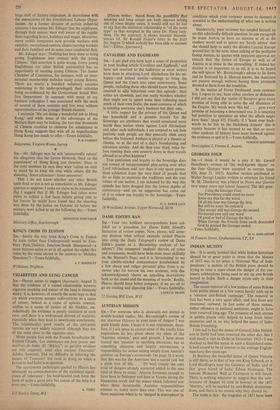AUSTRIAN MISSION
SIR,—For someone who is obviously not partial to double-headed eagles, Mr. Barraclough's review of my Austrian Odyssey in your issue of August 2 was quite kindly done. I hope it is not ungracious, there- fore, if I ask space to correct some of the totally false impressions he has given about my ideas of the 'Austrian mission,' past and present. I have never treated this 'mission' as anything Messianic, but as something objective and largely unconscious, a responsibility for action arising simply from Austria's position on Europe's crossroads. On page 34 I wrote that this was for the Austrians 'not a sacred task but a plain fact of life. . . 1ft was] simply the sum total of dangers already mastered added to the sum total of those to come.' Anyone fortunate enough to have been in Budapest and then in Vienna during the Hungarian revolt and the winter which followed saw what these inescapable Austrian responsibilities amount to, today more than ever. This was one of those occasions when to be 'steeped in atmosphere' (a condition which your reviewer seems to distrust) is essential to the understanding of what one is writing about,
Incidentally, your reviewer has tangled himself up on this admittedly difficult question. In one paragraph he urges Austria to have no mission at all in the modern world and to ignore my 'heady advice' that she should help to unify the divided Central Europe around her. In the next, when talking of the problems facing Austria, he quotes with apparent approval my remark that 'the future of Europe as well as of Austria is at stake in the unravelling.' If indeed her destiny is so important to us all, it is to be hoped she will ignore Mr. Barraclough's advice to lie down and be flattened by it. Heaven knows, the Austrians are passive enough without having these jeremiads shouted at them from the touchline.
In the matter of Franz Ferdinand, your reviewer has, I regret to say, been either careless or dishonest. I did not say that the victim of Sarajevo gave every promise of being able to solve the old dilemmas of the Empire. My words were 'His bid . . . gave every promise of becoming a determined one. It is tempting but pointless to speculate on what the effects might have been.' (page 67). Finally, if I 'leant over back- wards to be fair to the Habsburg dynasty' this is mainly because it has seemed to me that. so many other students of history have leant forward against the evidence to spit at it.—Yours faithfully,






























 Previous page
Previous page